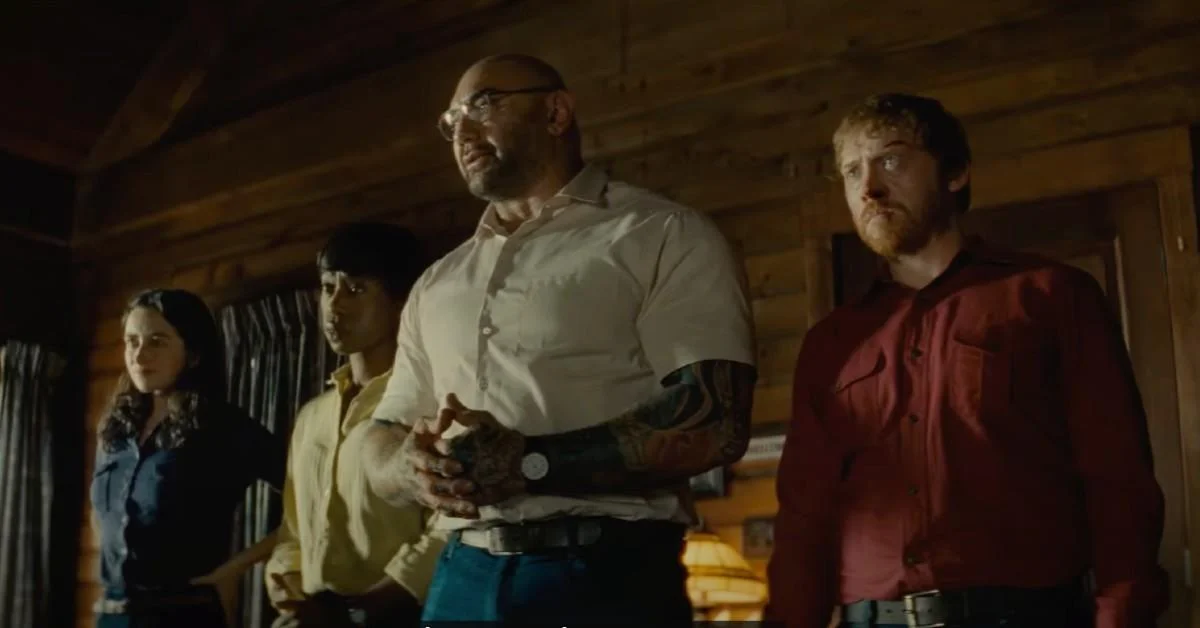
Director M. Night Shyamalan has always been known for his twists. Nearly every film comes with an anticipation of waiting for the unexpected explanation to drop off aliens, ghosts, and supernatural forces. Knock at the Cabin leans more into that anticipation of constantly questioning what’s going on in this terrifying tale. The embrace of that ambiguity is sure to make this his most polarizing picture. Those expecting the goofy twist will be disappointed, while those who appreciate Shyamalan’s penchant for tension may love it for how well it holds the mystery. The result is the director’s most intriguing work to date.
The premise keeps the psychological horror tight with uncertainty. The couple, Andrew and Eric, are vacationing at a cabin with their young daughter Wen. While Wen catches bugs outside, she’s visited by four strangers (Dave Bautista, Nikki Amuka-Bird, Abby Quinn, Rupert Grint) wielding weapons. The strangers fluctuate between pleading and violence while trying to stress the reason for their intrusion. The foursome believes the world will end if the family of three does not sacrifice one of themselves. While the tied-up family refuses to play this game, each group member offers to kill themselves and showcase the resulting damage to the world with each passing hour.
A big part of why the family doesn’t trust these strangers is because of the struggles they’ve had to endure. As a gay couple adopting a child, they’ve become used to the bigotry that’s cold as quiet parents and as explosive as fights. So when the couple suspects one of them was a bigot who previously hurt them, there’s a suspicion of a manipulative suicide cult at play. But when one of them has a concussion, doubts start forming. Even with the promise of the family being able to survive the apocalypse, the idea of letting all humanity suffer still weighs on their minds.
The film embraces this constant questioning of true intent and paranoia of conspiracies right up to its final scene. The good news is that there isn’t some wildly simplistic or left-field explanation for all the events. The bad news is that the ambiguity leaves so much to chew on about what the film says about faith, conspiracies, discrimination, and empathy that it could be easy to misread this picture. Something as morbid as “we need to believe online conspiracies” or “we need to be more religious, or we’ll all die” could be read if not looking between the lines.
Perhaps it’s because I was entranced by the tone that I appreciated the willingness to prolong the suspense. The cast keeps the mystery progressing and chilling, especially with the uneasy softness present in Bautista. The home invasion and the shocking sacrifices are brilliantly staged for some vicious violence. The camera work is also compelling as Shyamalan gets the camera uncomfortably close for the first few shots to lock the viewer into this intense cage and keep us there. It all works so well that I wish the film were longer than 100 minutes. If not to expand on the terror, then to better expand on the characters who seem to rush through their emotions and backstories.
Shyamalan’s Knock at the Cabin embraces a psychological horror with no easy answers and plenty to think about beyond the simplistic question of “Was there an apocalypse?” This focus on ambiguity helps bring out a story that can say more about our world rather than getting lost in the concept itself. Maybe Shyamalan should keep making movies based on horror novels, considering that this is the best work I’ve seen in quite some time, highlighting how this is a director who always tries to experiment.

 “Deadpool & Wolverine” Review
“Deadpool & Wolverine” Review  “The Boys: Season Four” Review
“The Boys: Season Four” Review  “The American Society of Magical Negroes” Review
“The American Society of Magical Negroes” Review  “Twisters” Review
“Twisters” Review  “Sausage Party: Foodtopia” Review
“Sausage Party: Foodtopia” Review  “Robot Dreams” Review
“Robot Dreams” Review  “Godzilla x Kong: The New Empire” Review
“Godzilla x Kong: The New Empire” Review  “Slave Play. Not a Movie. A Play.” Review
“Slave Play. Not a Movie. A Play.” Review 


